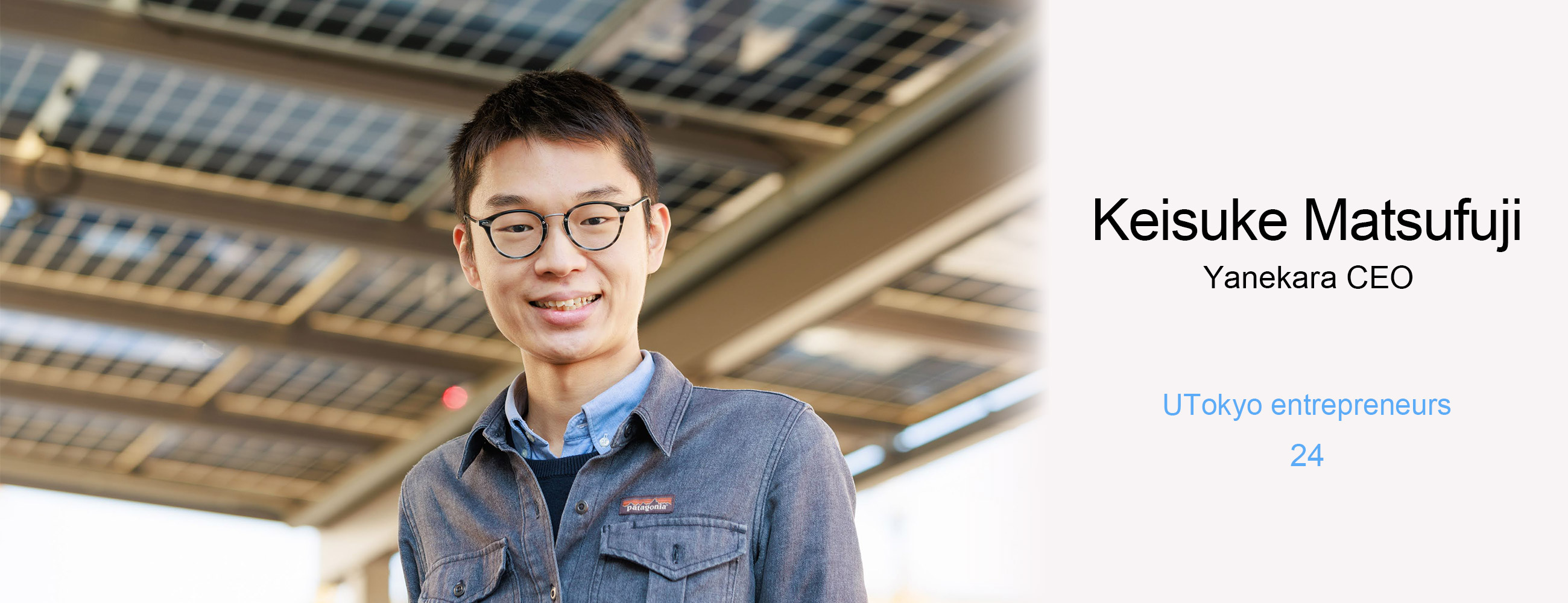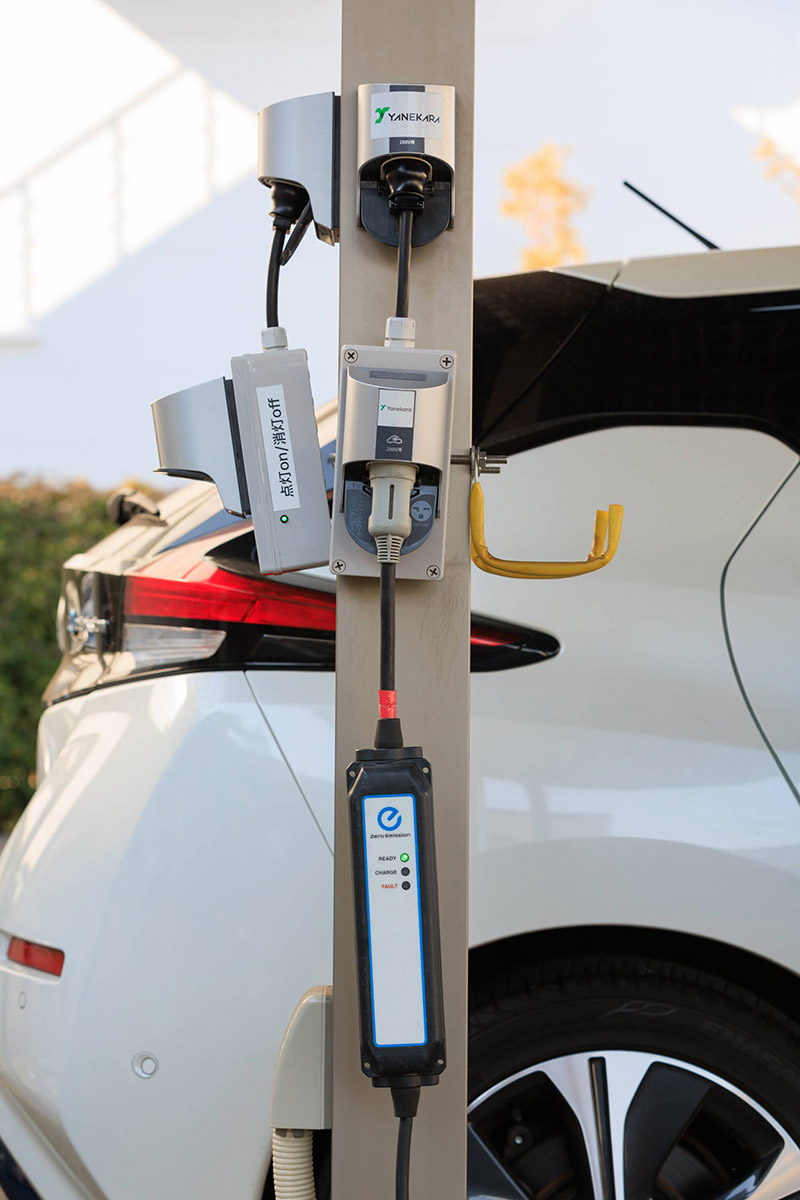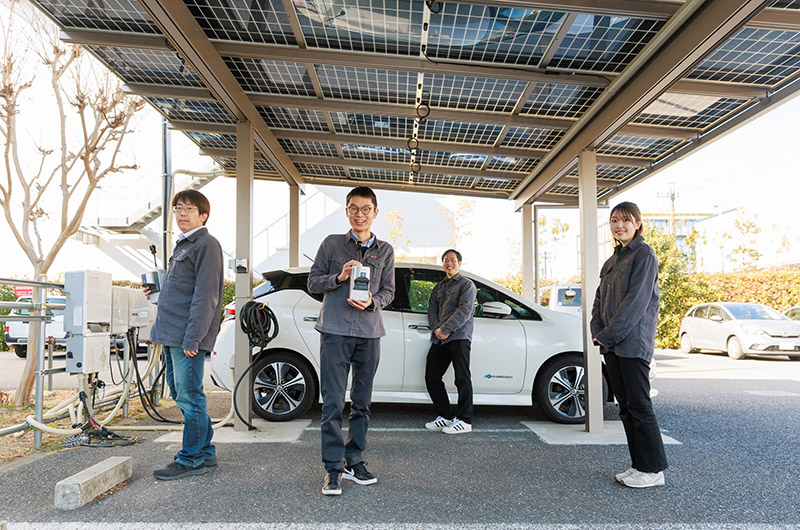From rooftops to EVs, sustaining our lives through renewable energy Entrepreneurs 24

This series introduces entrepreneurs who have received startup support from UTokyo programs or who have utilized university research. UTokyo’s support aims to expand Japan’s innovation ecosystem.

When Keisuke Matsufuji was a second-year student at the University of Tokyo several years ago, he realized how far Japan lagged behind other industrialized countries in fully utilizing solar and other forms of renewable energy.
“I wanted not only to devise methods for utilizing all the solar energy generated without wasting any of it, but also to translate these methods into practical applications,” Matsufuji recalled. This sense of urgency eventually led him to establish Yanekara Inc. as CEO in 2020, with the support of UTokyo’s startup incubation ecosystem.
Yanekara, based in the city of Kashiwa, northeast of Tokyo in neighboring Chiba Prefecture, offers power storage solutions that integrate solar energy generation, storage batteries and electric vehicles (EVs), ensuring that every bit of solar energy generated does not go to waste and is consumed as electricity by users. Driven by its mission of sustaining our lives on Earth by achieving a 100% renewable energy rate and 100% energy self-sufficiency rate in Japan, Yanekara provides energy storage solutions using commercially available equipment.
The company name derives from the Japanese term meaning “from roofs,” reflecting the startup’s commitment to harnessing all the energy generated from rooftop solar panels. It has succeeded in developing its own “vehicle-to-grid” (“V2G”) products for optimizing recharging and discharging EVs, allowing the cars to operate at a lower cost.
Matsufuji is now focusing on establishing a virtual power plant — a network comprising decentralized, small-scale solar power-generating units, such as households and small business operators, along with power storage units like EVs and storage batteries — with a cloud system controlling the power supply and demand.
Childhood awakening to energy issues

As part of a summer vacation school project when he was in the sixth grade, Matsufuji experimented with solar cooking, making boiled eggs and pancakes by concentrating sunlight into one spot using a mirror or aluminum foil. Through this project, Matsufuji came to realize that solar energy can provide sufficient energy for daily living. This experience heightened his awareness of energy issues and motivated him to pursue studies at UTokyo to become a researcher in this area.
However, as he neared the end of his second year at the university, Matsufuji began to reconsider his envisioned career path as a researcher. “There had been technological innovations in the energy field, particularly in the area of solar cells,” Matsufuji explained. “I felt that my impact on society as a future researcher would be very limited.” Consequently, he shifted his focus to exploring how Japan can effectively utilize renewable energy sources — an area where the country lags behind its counterparts in the developed world.
In a sign of this dire situation, Japan has recently resorted to output curtailment, a measure where renewable-energy production is suppressed to prevent imbalances in power supply and demand. Although scientific research on storing surplus energy produced by renewable sources has made some headway, its practical application has not kept pace.
Tapping startup ecosystem
Just as his mindset shifted, Matsufuji met Daichi Yoshioka, who was studying environmental issues at the University of Freiburg in Germany and who later would become the co-founder and chief operating officer of Yanekara. After the two began holding regular online study sessions together, Matsufuji embraced Yoshioka’s proposition that Japan should aim to achieve a 100% renewable energy rate, like Germany. Following brainstorming sessions, they concluded the best way for Japan to achieve that goal would be for them to launch a startup and put their idea into action.
Matsufuji subsequently enrolled in Entrepreneur Dojo, a systematic entrepreneurship and startup learning program sponsored by UTokyo’s Division of University Corporate Relations. He also participated in the Spring Founders Program (SFP) of the division’s Hongo Tech Garage, a space created with the support of Daiwa Securities Group Inc. for students to work on side projects. During his involvement in the SFP, which has the aim of supporting technological projects, Matsufuji produced a prototype of V2G equipment and gained expertise in product development.
Matsufuji's proposal for the development of a V2G system using electric vehicles for energy storage was then selected by the Mitou Advanced Program of the Information-technology Promotion Agency, Japan, securing funding of 10 million yen. Subsequently, Matsufuji and Yoshioka co-founded Yanekara in June 2020.
Hands-on approach to business development
Since its inception, Yanekara has been involved in energy storage solutions, offering systems tailored to the specific needs of each facility to store energy generated by solar power generators in electric vehicles, storage batteries and heat pumps. The systems basically are built from equipment available commercially to reduce costs.
Implementing such systems enables business operators to achieve “peak shaving,” which reduces electricity usage during peak hours. This is accomplished by utilizing power generated during the day for consumption during evening peak hours. As a result, businesses employing such systems can mitigate increases in their electricity bills. Following the adoption of its solution on a demonstration basis by Hioki E.E. Corp., a Japanese manufacturer of electrical measuring instruments, Yanekara steadily expanded its client base.
For Yanekara, visiting the actual sites where solar energy is generated or electric vehicles are used for electricity storage is of paramount importance. “Doing so is essential to understanding the needs of our clients so that we can develop prototypes of products that address their problems, and then gather feedback from clients to improve the prototypes,” Matsufuji, who conducts such visits almost daily, explained.
Such practice led to the development of Yanekara’s own products. Based on feedback from electric vehicle and storage battery users, the company developed YaneCube, an adapter that adds remote control functionality to existing EV charging outlets. This product enables power storage during periods of low electricity demand and utilization during peak demand hours, thus facilitating “peak shifting” and cost reduction. Japan Post, the country’s postal service, has already installed 93 units at its Ginza Post Office, using them to remotely control EV charging for mail and parcel collection and delivery.
Additionally, Yanekara is scheduled later in 2024 to market YaneBox, which provides V2G functionality to existing solar power generation systems.
Looking ahead, Matsufuji aims to establish a virtual power plant that connects small business operators through cloud networking, which will make it possible to balance energy supply and demand within a community.
“Our goal is to build a ‘Kurobe Dam of the 21st century’ by implementing various power storage systems in society,” Matsufuji said, referring to Japan’s iconic 20th century dam in Toyama Prefecture, completed in 1963 using civil engineering technologies of the period and built to stabilize the power supply and demand imbalance in the post-World War II era. “In the 21st century, we will strive to address this challenge of power balance adjustment through software-based solutions, such as virtual power plants,” he said.

Yanekara Inc.
Founded in 2020 by Keisuke Matsufuji, then a fourth-year Faculty of Engineering student at UTokyo, and Daichi Yoshioka. The startup was selected by UTokyo Innovation Platform Co., Ltd. (UTokyo IPC)’s 1stRound startup incubation program in 2021, securing 5 million yen in funding. UTokyo IPC and partners also provided 42 million yen in 2021 and 60 million yen in 2022. In addition to funding from the New Energy and Industrial Technology Development Organization (NEDO) and other public entities, the company procured 160 million yen from the private sector, including 31Ventures, Mitsui Fudosan Co., Ltd.’s startup growth acceleration program. While remaining as CEO, Matsufuji continued his studies in the Department of Electrical Engineering and Information Systems until obtaining a master's degree in March 2023. As of April 2024, the startup has three executives and six employees, working with a team of experienced engineers and senior advisers to ensure product reliability. The company has enlisted some 30 members who are contributing to its operations. It aims to expand its business overseas, including ventures in India and Indonesia, by 2030.
Date of interview: Jan. 30, 2024
Interview/Text: Yumiko Mori
Photos: Public Relations Group






